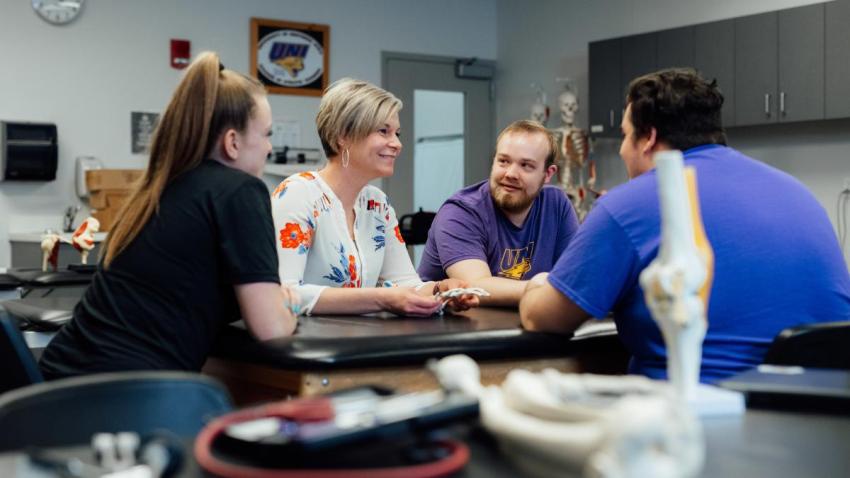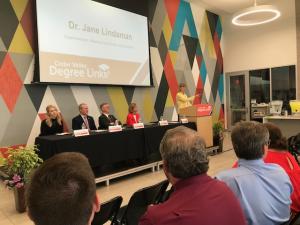New options, flexible career paths
Look “behind the curtain,” and you’ll find that while the majority of University of Northern Iowa students are 18- to 22-year-old undergraduates enjoying a traditional, residential experience, there are multiple variations on the theme here.
Depending on program, 30 to 40 percent are transfer students – perhaps the same age, or older, and often representing a more diverse community. The majority of our graduate programs attract older, practicing professionals, or adult learners. There are first generation, students of color, international students and those who reflect a legacy of graduates from UNI.
This potpourri of backgrounds is also changing the definition of what it takes to attain a college degree. This past year, the UNI College of Education was in the forefront of efforts to respond to changing needs and the desire for alternative pathways to a degree.
Athletic training adds 3+2 accelerated option
 Until now, UNI students focused on athletic training have had one option to meet criteria for national certification: complete a four-year bachelor’s degree followed by the two-year Master of Athletic Training degree.
Until now, UNI students focused on athletic training have had one option to meet criteria for national certification: complete a four-year bachelor’s degree followed by the two-year Master of Athletic Training degree.
The UNI athletic training faculty in the Department of Health, Recreation and Community Services realized that students were looking for an option that let them achieve their degree sooner and at less cost. UNI, however, did not easily allow for this type of articulated program. The athletic training faculty sought to change that – and succeeded, with the approval of a new 3+2 option beginning fall 2022.
This new, intensive pathway blends three years of undergraduate studies and two years in the master’s program at UNI. Upon completion, graduates earn their BA and MATR. As a result, students will save a year of undergraduate tuition as well.
“The combined degree option allows students to enter professional practice more efficiently than the traditional path. While this option is not unique in athletic training, what we offer at UNI is one-of-a-kind,” says Kelli Snyder, EdD, ATC, LAT, program director of athletic training.
“By combining our master of athletic training degree with the clinically-based foundational bachelor’s degree in athletic training and rehabilitation studies–which was designed to prepare students to enter graduate studies across a multitude of healthcare professions–our students are engaged in clinically-focused coursework and actual clinical experiences from their first semester at UNI,” Snyder says. “Regardless of whether students choose the traditional or 3+2 plan of study at UNI, they are able to learn from licensed healthcare providers both in the classroom and clinic throughout their time at UNI.”
New pathways in elementary education
As the largest undergraduate degree offering at UNI, elementary education is a cornerstone of the UNI Teacher Education program. While the traditional four-year degree program continues to reflect the majority of students’ experience, innovative new options are opening doors to more students who will both grow and diversify the teaching workforce in years to come.
Purple Pathway for Paraeducators
 The lived experience of paraeducators in classrooms across Iowa benefits students enrolling in the new Purple Pathway for Paraeducators program. Working paraeducators with an associate’s degree can now earn a bachelor’s degree in two years in an accelerated, fully online program.
The lived experience of paraeducators in classrooms across Iowa benefits students enrolling in the new Purple Pathway for Paraeducators program. Working paraeducators with an associate’s degree can now earn a bachelor’s degree in two years in an accelerated, fully online program.
“We recognize it’s a tough balancing act for adult professionals to work and study at the same time. We also better understand the lived experience paraeducators bring. They are already in classrooms and have a base of knowledge,” Dean Colleen Mulholland said. “Those learnings have led us to take an intensive look at how we can take advantage of this experience and streamline the coursework for our para students while maintaining the standards expected by us and the state.”
This fully online framework, which includes both synchronous and asynchronous coursework and one Saturday of virtual or on campus classes monthly, builds off more than 25 years of experience with a 2+2 program offered in conjunction with Des Moines Area Community College and accessible via other Iowa community colleges as well. The difference is a slightly more compact course schedule that allows paraeducators to build from and use their school district settings as they complete coursework and field experiences, setting them up for student teaching and licensure. All students enrolled must have a school leader’s support to participate.
Students completing the program will earn both their BA as well as a minor in special education which meet endorsement requirements for teaching K-6 and the special education instructional strategist (Strat I, K-8).
The program announcement paralleled news of the Iowa Apprenticeship Program which awarded grants to school districts across the state to support paraeducator teacher education training. UNI expects to enter into agreements with several districts using this option to support their paraeducators. Online classes begin August 22.
Degree in 3
 High school students in Waterloo, Iowa, will be part of a first for the state with the launch of the Degree in 3 program, a fully articulated program that can lead to a teaching degree three years after high school graduation.
High school students in Waterloo, Iowa, will be part of a first for the state with the launch of the Degree in 3 program, a fully articulated program that can lead to a teaching degree three years after high school graduation.
The program is part of Cedar Valley Career Links, a partnership among the Waterloo Community School District and its Waterloo Career Center (WCC), Hawkeye Community College and UNI. Students gain credit for coursework beginning in high school through the WCC, complete their associate’s degree in one year at Hawkeye, and then transfer to UNI for the final two years leading to their BA in elementary education.
Gov. Kim Reynolds and current elementary education student Emily Riley joined in a signing ceremony of the three partners on May 31. Riley will also complete her degree in three years after creating her own path via WCC, HCC and UNI, but that included heavy course loads and summer classes. The fully articulated Degree in 3 program will provide a smoother pathway for future students.
